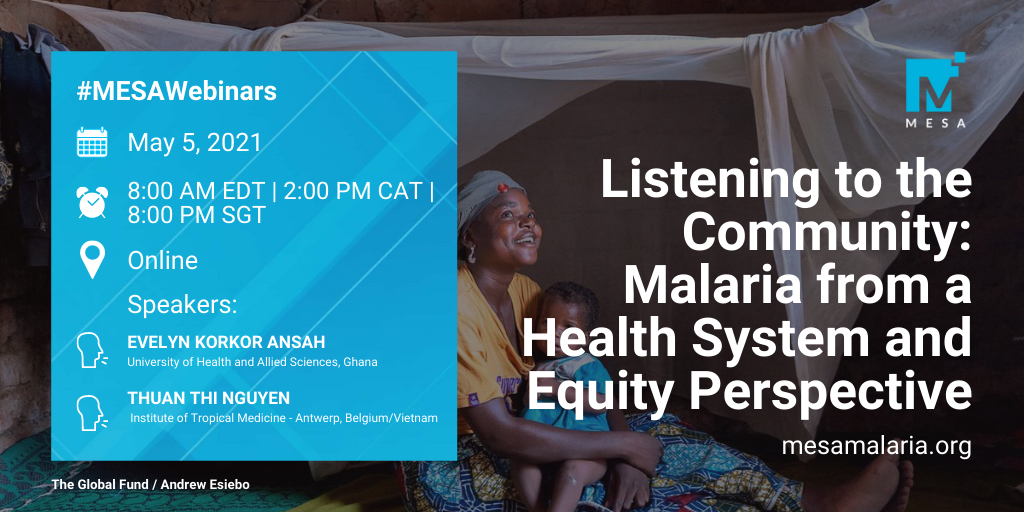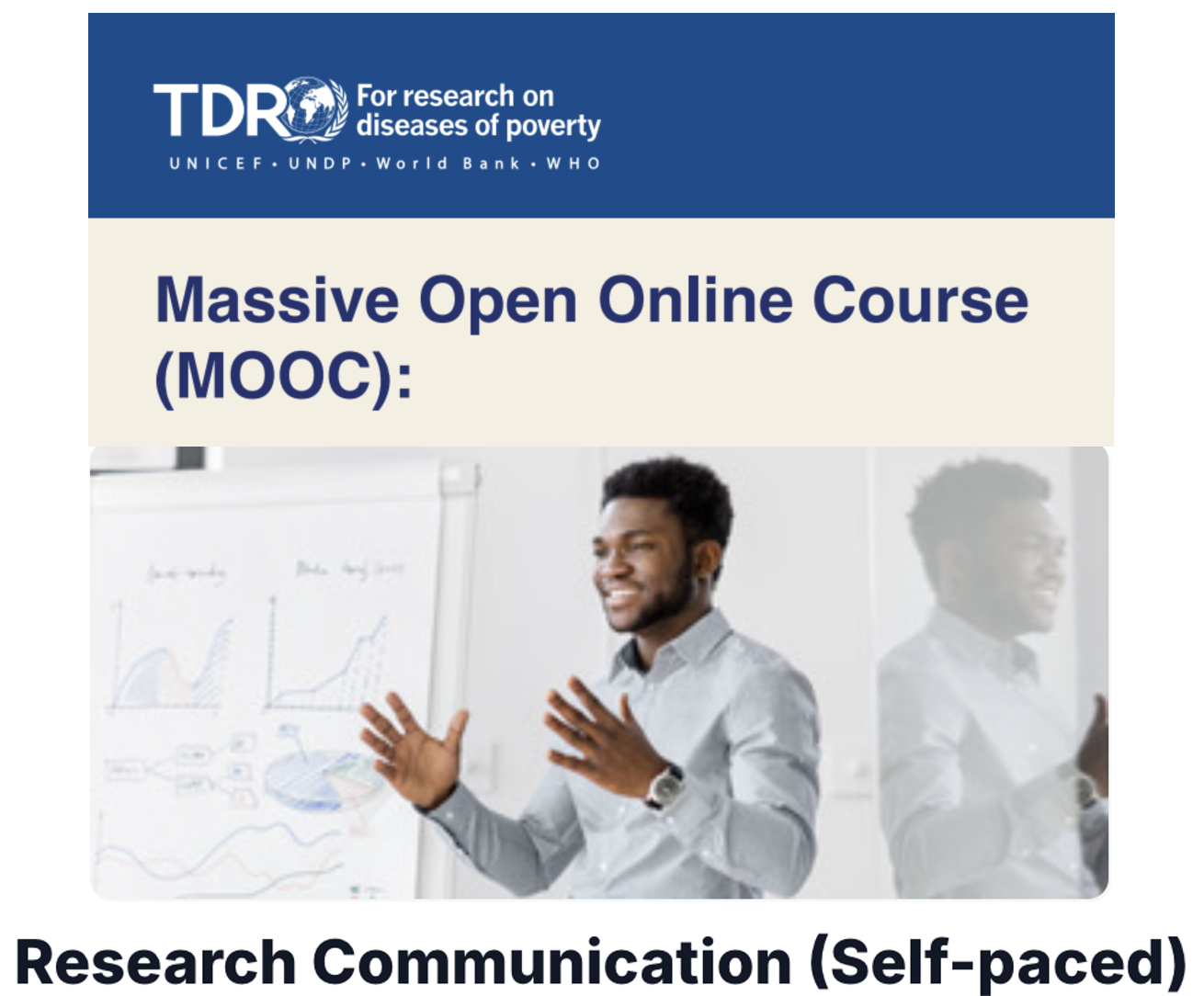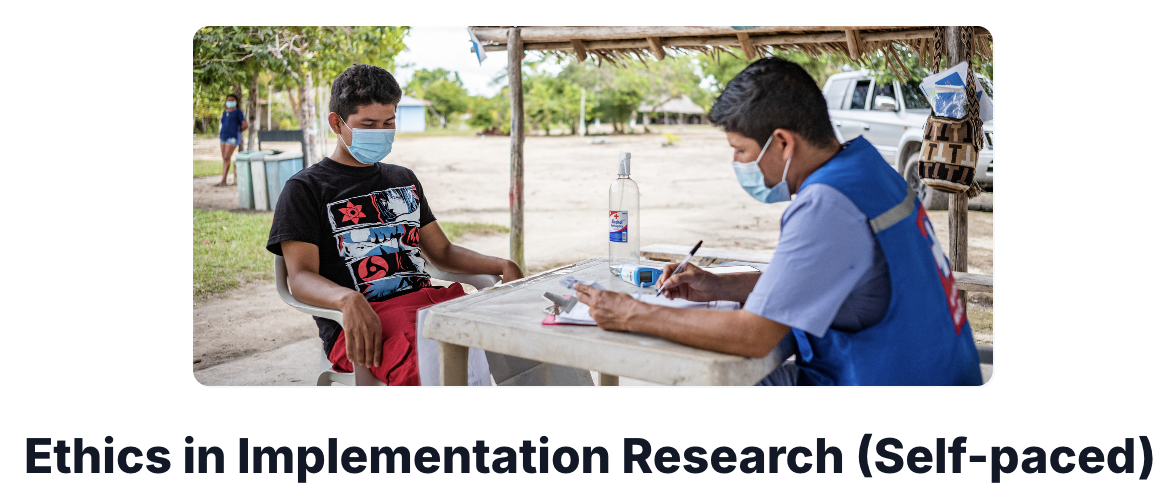MESA Webinar 1 – Listening to the Community: Malaria from a Health System and Equity Perspective
Published: 07/05/2021
This report is brought to you by the MESA Correspondents Nkemngo Francis Nongley, Vita Mithi, Faith Hungwe, and Ana Alonso.
THEMES: THEMES: Social Science
MESA Correspondents bring you the coverage from the MESA Webinar 1 – Listening to the Community: Malaria from a Health System and Equity Perspective
Wednesday 5th May 2021
Opening Remarks
Regina Rabinovich (Barcelona Institute for Global Health – ISGlobal, Spain), excitedly welcomed the participants to the first MESA webinar, the platform to showcase the work of malaria-endemic researchers. Rabinovich pointed that the aim of the webinar series is to highlight the progress and challenges faced across various malaria fields ranging from social sciences, entomology, insecticide, drug resistance, modeling and genomics. The webinar series will be held every Wednesday of the upcoming months for one hour featuring two researchers. Then she introduced the moderator, Khátia Munguambe (Manhiça Health Research Centre – CISM, Mozambique), who proceeded to present the general theme for the session, “lessons learnt in solving problems in malaria from a health system and equity perspective, highlighting the sustainability, effectiveness and acceptability of malaria interventions among the vulnerable populations”.
Listening to the Community: Implementation of interventions for control/elimination of malaria
Professor Evelyn Korkor Ansah (University of Health and Allied Sciences – UHAS, Ghana) focused her research presentation on Ghana and started by stressing that malaria is a preventable and treatable disease, with progress being made in Ghana and other countries. However, the disease continues to be a cause of morbidity and mortality, while antimalarial drugs continue to be overused due to massive over-diagnosis of malaria. Her research incorporated private drug retailers as a point of malaria diagnosis and treatment. In most African countries including Ghana, a great number of children and adults visit only private drug retails for treatment. This is facilitated by the cost of living, nature of the patient, traveling long distances to the clinic, and long queues to grasp the doctor, receive laboratory results and medication. As such, people decide to utilize the nearby private drug retailers. Ansah stated that the global shift from presumptive malaria diagnosis to antimalarial treatment guided by parasitological testing is the attitude that Ghana needs to take. Therefore, with this research they aimed to 1) find out if private drug retailers could be trained to successfully and safely carry out rapid diagnostic tests for malaria, 2) explore whether testing for malaria by the shop attendees prior to dispensing medicines was feasible and acceptable to both the clients and the attendants, 3) find out if introducing the test in drug shops would help to achieve targeting of antimalarial clients, and 4) discuss, listen and partner with the community on how best to implement the intervention.
The study comprised different activities: initial discussions with community leaders and opinion leaders, focus group discussions to explore the community perceptions, local film production demonstrating malaria rapid diagnostic tests (mRDT) use in shops, and finally the introduction of mRDT intervention through a cluster-randomized trial. Results showed that appropriate treatment was 3 times higher in the intervention area compared to the control area, also that sales increased and improved, and a positive community members’ perception to be able to refer patients to the closest hospital when they had a malaria negative test but felt sick. To conclude, Ansah shared the lessons learnt underlying the importance of having the community on board from the start, as they understand their context better. She emphasized once again the need to listen to the community, work and partner with them for implementation of any intervention.
Understanding malaria persistence: A mixed-methods study on social factors limiting the effectiveness of malaria elimination strategy in South-Central Vietnam
Thuan Thi Nguyen (National Institute of Malaria, Parasitology and Entomology, NIMPE, Vietnam; Institute of Tropical Medicine of Antwerp, ITM, Belgium), began by sharing Vietnam’s optimism of eliminating malaria by 2030 despite vector control challenges at forest fringes along international borders with Laos and Cambodia. Her research presentation focused on understanding malaria persistence in 10 Ra-Glei villages, in Bac Ai district, Ninh Thuan province. Specifically, she studied how social factors limited the effectiveness of local malaria elimination strategies, from 2016-2018, using a mixed-methods approach. Her study results show that, despite the government efforts of resettling locals to a new village away from the forest, many sought the economic stability offered by the forest and migrated back to the traditional land with vast arrays for farming, cattle rearing and food collection. This traditional housing, with open space, exposed people to infected mosquitoes. This, together with the inconsistent insecticide-treated bed nets (ITN) usage in the forest fringes, has increased vector exposure amongst the populations.
She emphasised that the information, education and communication (IEC) materials used are not well understood by the locals as the majority cannot read these messages. Moreover, the campaigns focus more on the risks of malaria rather than its prevention. Furthermore, despite free malarial testing and antimalarial treatment offered at public health facilities, most Vietnamese prefer over the counter drugs. She noted that active surveillance of people who are constant targets for malaria research is futile as people move frequently due to slash-and-burn farming activities. Nguyen recommended that public health interventions, systematic approaches and formative research, should include community participation and inclusion of marginalised voices, as well as feedback in designing, implementing and improving interventions.
In the end, both speakers had the chance to share their take-home message and both agreed that if we are to eliminate and/or control malaria, there is a need to listen and work with the community. Apart from that, knowledge and solutions coming from diverse groups and/or disciplines are required, for there is no one-way approach against malaria.
Closing remarks
Regina Rabinovich thanked the panelists for their time and for such an intriguing session and strongly voiced that “the power of women is quite evident in malaria”. She was optimistic that the participants and those that would watch the first webinar session would have enjoyed. She further pointed out that the audience should join for the second webinar of the series that will feature Fredros Okumu (Ifakara Health Institute, Tanzania) and Mercy Opiyo (Barcelona Institute for Global Health – ISGlobal, Spain / Manhiça Health Research Centre – CISM, Mozambique to discuss new approaches to improve malaria mosquito surveillance and control.
Read here the pending questions & answers addressed by the speakers after the Webinar.
This report is brought to you by the MESA Correspondents Vita Mithi (Armref Data for Action in Public Health Research, Malawi) and Faith Hungwe (Botswana – University of Pennsylvania Partnership, Botswana). Senior editorial support has been facilitated by the MESA Team.
Published: 07/05/2021
This report is brought to you by the MESA Correspondents Nkemngo Francis Nongley, Vita Mithi, Faith Hungwe, and Ana Alonso.
THEMES: Social Science



